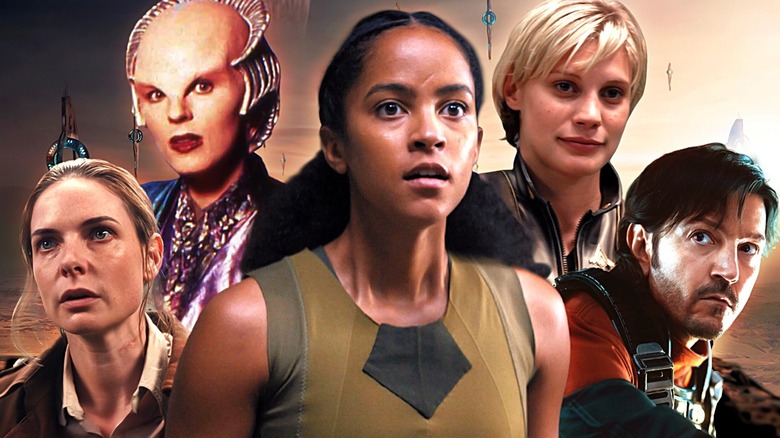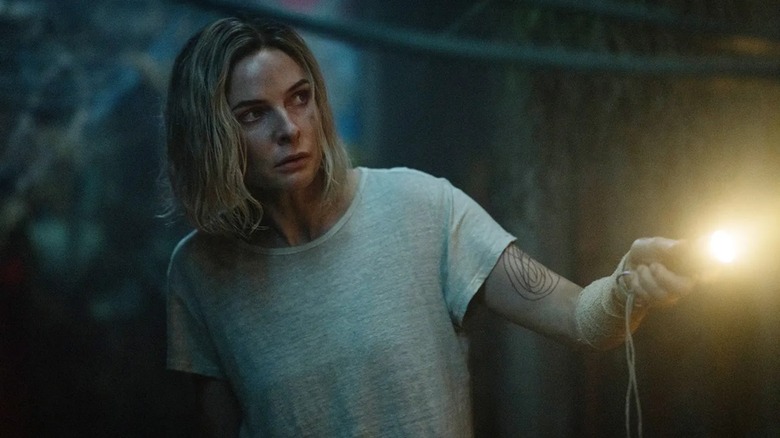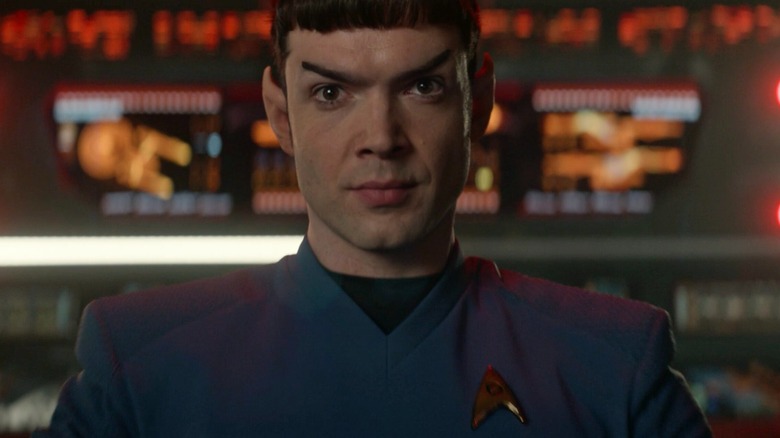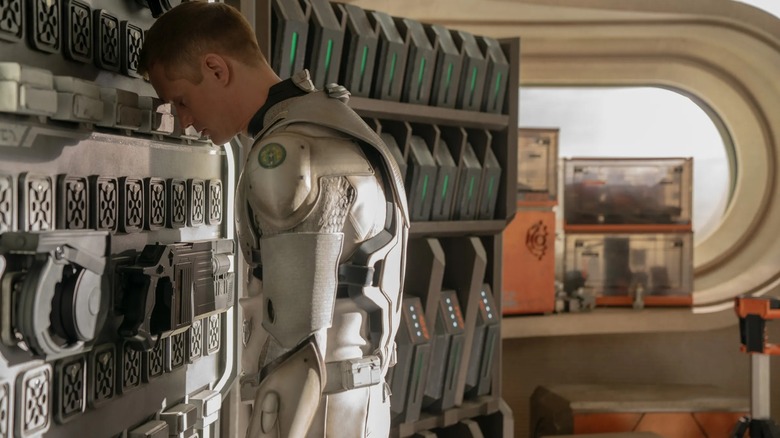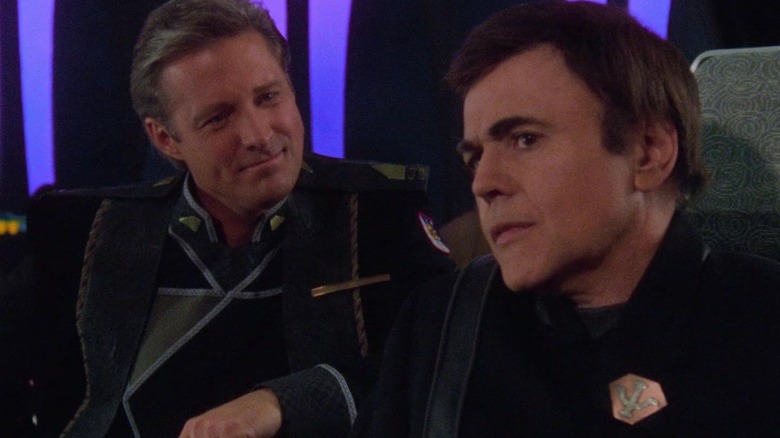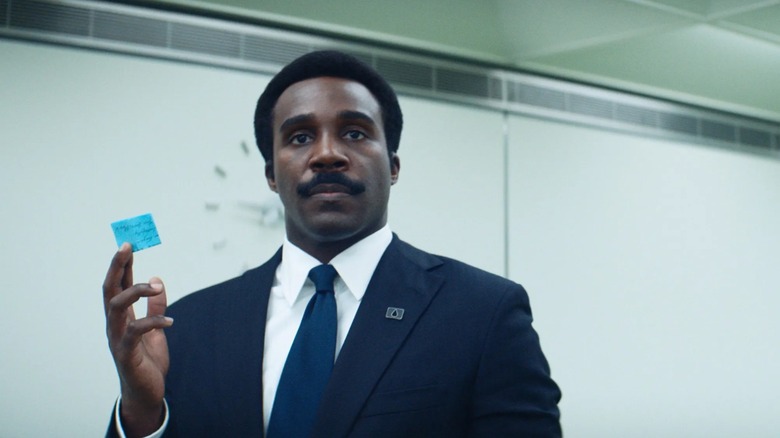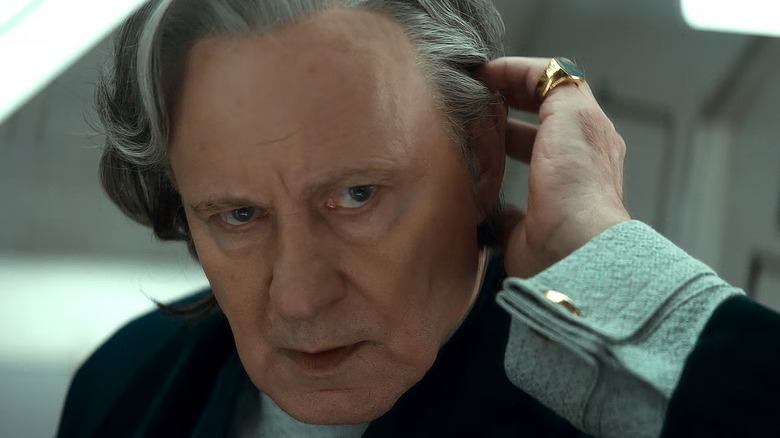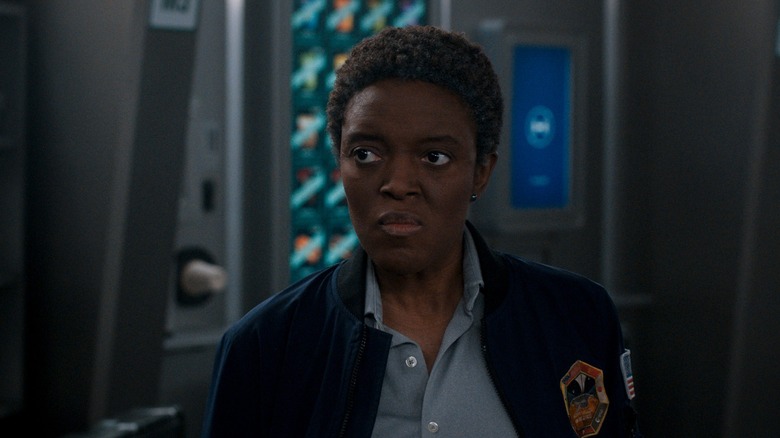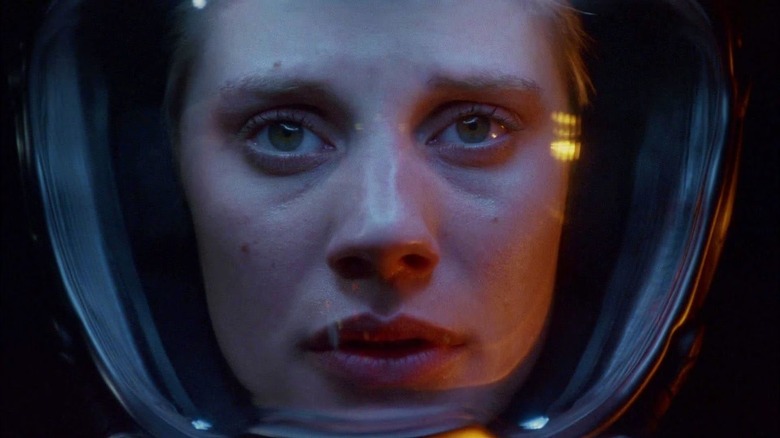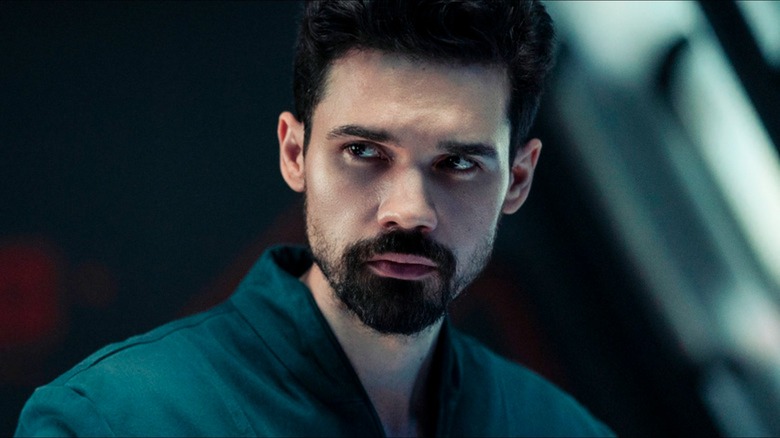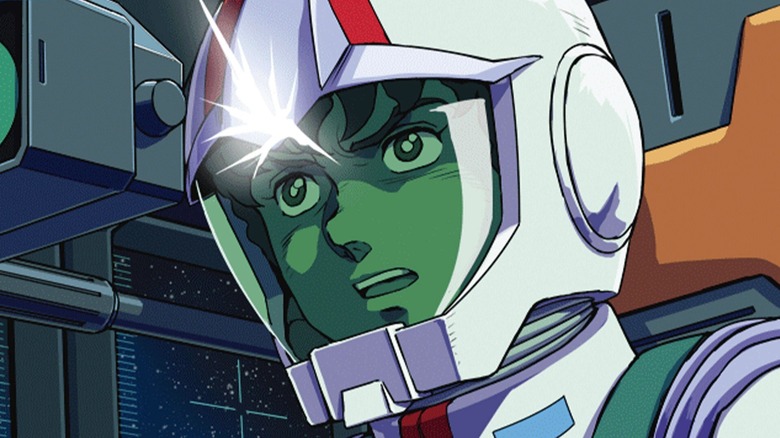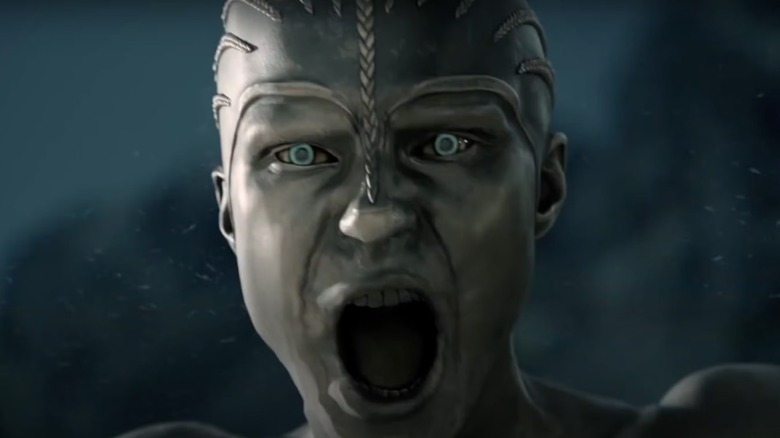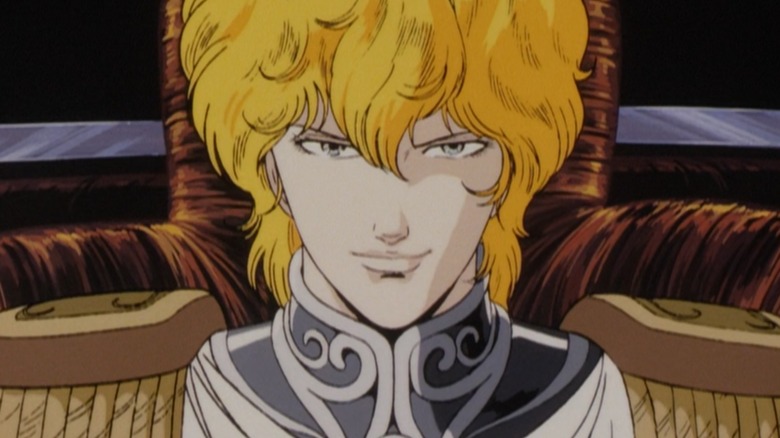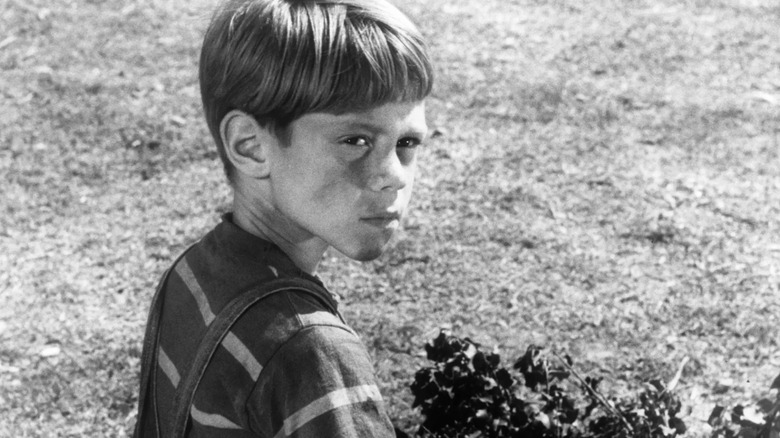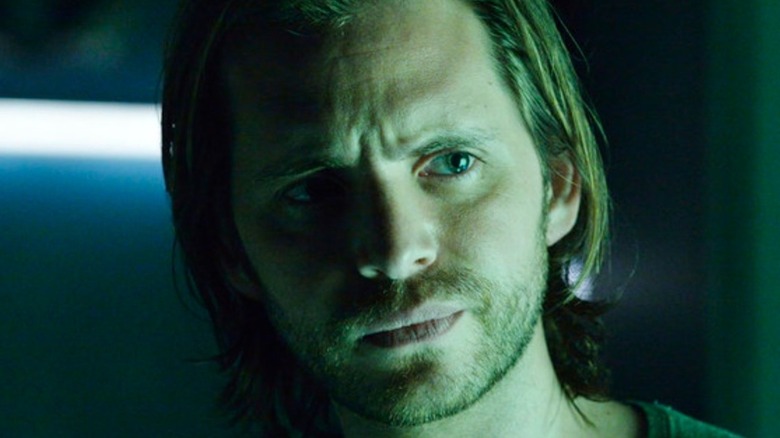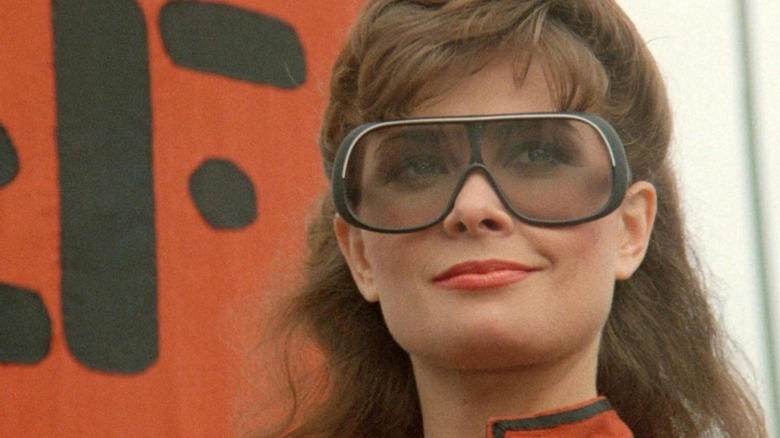15 Best Sci-Fi TV Shows Like Foundation
The most special thing about Apple TV+ and its embrace of science fiction isn't the surprisingly broad swath of content available to fans. It's that the service is willing to go back to the era when shows needed time to build their audience, and to really hit their stride. "Foundation" is the herald. It's not just a smart adaptation of an Isaac Asimov series so broad and deep in scope that fans thought it would be impossible to film (especially with its complicated relationship with Asimov's "Robot" novels), but Apple let it keep building up toward a fantastic third season that shows the potential of its author's imagination.
Cerebral, clever, and incredibly well cast, with "Chernobyl" star Jared Harris and the underrated Lee Pace of "The Fall" and "Pushing Daisies" fame, the show puts it all out there for fans to puzzle over, creating a space for fans to crave more TV that rewards our intelligence and attention spans. It's hard to find something that'll scratch that itch, but we've got 15 great science fiction TV picks for binging in between "Foundation" episodes. They're everything from classics to fellow Apple hits that are ready for bigger audiences. We hope you'll share their galaxies with us.
Silo
Based on the bestselling novels by Hugh Howey, "Silo" is a bottled-up cavern of mysteries that's also been building a thriving audience on the Apple service. Starring Rebecca Ferguson ("Dune") and Tim Robbins, it's plain from the get-go that this supposedly life-saving bunker with its hundred-plus floors of vertical city is hiding a lot more than its protagonists realize.
Divorced from their history, supposedly because the records are lost, thousands of humans live in an underground silo, bounded on all sides by increasingly restrictive laws that, the leaders claim, are intended to "protect" them. Anyone who's played a "Fallout" game knows this premise is wearing some stinky cologne, and we're quickly gripped by revelations about what we naturally assume going in: Everyone's lying, but nobody's quite sure about what. Best of all, new fans won't be left with only the books to finish the story. Apple has already committed to four seasons to ensure that the whole sordid thing will eventually come to light. Take it from Stephen King's own recommendation: This is great news for sci-fi fans.
Star Trek: Strange New Worlds
Longtime "Star Trek" fans can pinpoint the many times they've been drained of love for their favorite franchise, whether it's the misbegotten "Section 31" movie or the somewhat over-hated "Star Trek: Enterprise." "Star Trek: Strange New Worlds" is the salve an overdone franchise desperately needed — even if we're still going back to the well-trod Kirk/Spock era.
No matter how tired we may be of Spock revivals, it's near-impossible to resist Ethan Peck's deadpan charm. Nor can we stop admiring Anson Mount's incredible pompadour as the ill-fated Captain Christopher Pike. Most importantly, however, it's a series that's not afraid to get real weird with it, in a classic golden age of pulp science fiction way. Stories about hope and exploration mingle with real-world morality studies and silly costumes, just like in the '70s. Even if you're not the biggest Trekkie out there, this show represents the sort of sci-fi Isaac Asimov grew up with. As season 3 of "Strange New Worlds" kicks into a fantastic high gear, we're all the better for it.
Murderbot
If I can convince a science fiction fan to try just one other show on Apple TV+, my heart begs you to give the adaptation of Martha Wells' Hugo Award-winning "Murderbot Diaries" series a shot. Alexander Skarsgård, who's never afraid of getting weird, stars as the titular Murderbot, a genderless construct cheaply manufactured from flesh and steel that's hacked its way out of corporate control and is now free to — no, not commit murder! Although if it has to, it has to. No, Murderbot wants to be left alone to binge-watch its favorite TV shows.
You think Lt. Cmdr. Data is relatable? Wait until Murderbot busts out corny quotes from its favorite show, "The Rise and Fall of Sanctuary Moon," to fake its way through a conversation. Does it work out? Not well, but Murderbot keeps on trucking through the worst fate an antisocial android could face: running security for a bunch of space hippies that keep wanting to befriend it. Good luck, Murderbot. We hate eye contact, too.
Babylon 5
"Babylon 5" appears on many of my science fiction recommendation lists, for good reason. As vital and relevant as the day it first aired — even if the CGI's gotten spotty in places — it's a saga of fully realized alien histories as they run up against the potential of humanity's future. Everything you can imagine will come up for discussion within the fragile neutrality of the Babylon 5 space station, from imperialism to medical ethics and PTSD, and all of it will bring changes you can watch happen down the line.
It's one of the first visual novels for SF television fans, with a five-year storyline successfully planned and executed despite the occasional behind-the-scenes hitch. Modern activists will find the Centauri-Narn conflict painfully relevant, and those of us haunted by current events in American politics will watch President Clark seize control of Earth with a similar anxiety as "Andor" fans felt. It's a 30-year-old series that can't age in the ways that matter, foretelling all-too-real societal downfalls with the same blunt factualness as Hari Seldon's psychohistory.
Severance
Under the hood of "Severance," with its anti-capitalist vision of what it would be like to live in your nightmares where you can't stop dreaming about work, is a smooth-running engine full of sly, pulpy sci-fi goodness and a cast that elevates the already necessary standards for cerebral sci-fi.
In the dead white bowels of Lumon's severance floor, isolated employee squads are meant to live their half-lives without more than the barest of "motivating" clues about their outside selves. The idea is that their outside half gets to live free of the exhausting mental burdens of their job. But that's not the whole truth, and what Lumon really wants from its functionally enslaved employees is ominous and callously cavalier about the heart of our human experiences. Mark (Adam Scott), Helly (Britt Lower), and Dylan (Zach Cherry) are just a couple of our guides into just how much worse Hawaiian Shirt Fridays at the office can get. Best of all, "Severance" episodes are weekly drops, meaning appointment TV is back, baby.
Andor
Like "Strange New Worlds," you don't have to be a hardcore "Star Wars" fan to dig "Andor," the two-season prequel to "Rogue One." Celebrated for its timely discussion about the importance of every act of resistance under an implacable empire, it's a defiant and emotional requiem for everything that must be sacrificed to win freedom. It's also, sometimes, about how seductive the easy security of the Empire can be.
Played by Stellan Skarsgård, who made "Chernobyl" into one of the best dramas of all time alongside "Foundation" star Jared Harris, Luthen Rael is the purposefully unknown, untrusting, often unlovable keystone of the nascent Rebellion. Eventually, he grooms Cassian Andor (Diego Luna) into his far more affable field agent, a man who will learn just how much he's willing to give to win everyone the desperate chance they need in "Rogue One." Yet the title is almost a fib; Andor is the link between multiple factions working toward the same goal, but the story itself is shared with Mon Mothma (Genevieve Reilly), the Rebellion's mother, and the terrible desperations of Saw Gerrera (Forrest Whitaker). Even Rael's story is balanced with his even more ferocious assistant Kleya (Elizabeth Dulau). Note-perfect and melancholy, you'll eagerly rewatch "Rogue One" when you're through.
For All Mankind
Isaac Asimov probably would've enjoyed "For All Mankind" as much as NASA does. It's an alternate history take on the 20th-century space race between the United States and the Soviet Union. In real life, America kicked its space program into high gear after the Russian satellite Sputnik became the first stable human construct in orbit. Though Sputnik lasted only a year before its orbit disintegrated, Yuri Gagarin's successful spaceflight pushed the U.S. into ensuring it was the first to land on the moon. We've been resting on our laurels since, and today, NASA is struggling for life under an anti-science regime.
On "For All Mankind," the Soviets kept winning that race, pushing America further toward social revolutions that, to be honest, sound really good right now: Increased diversity, grander scientific goals, clean energy, and a new race for Mars. As decades pass, however, divisions between our countries change and deepen, events we know alter in shocking ways, and the fight to conquer space remains as deadly as it was the first time a human being faced the oppressive radiation of that ceaseless void. This is another Apple series winner, from the mind behind "Battlestar Galactica."
Battlestar Galactica
Speaking of "For All Mankind" creator Ronald D. Moore, his "Battlestar Galactica" reboot overcame fan suspicion and original cast derision to create something special. Dirk Benedict (the original Starbuck) did his best to become a Lex Luthor-class hater, spewing misogynistic garble in Katee Sackhoff's general direction, but since her version of Starbuck is a new genre standard, and she's a damn Mandalorian now, poor Benedict's in the hole with Dean Cain.
More importantly, the new "Galactica" shed the layers of Mormon oddity that fueled Glen Larson's still-enjoyable tale of humanity's last ark traveling through space, replacing it with some equally weird and wonderful diatribes against fundies and the harmful paranoia of our post-9/11 lives. The ending — which we won't spoil, just in case — cements "Battlestar Galactica" as a silly but meaningful show, one of the best post-pulp SF sagas on modern television. You can even pretend it's a "Foundation" prequel if you want. Just don't go tell it to Isaac Asimov's grave: He really hated the original "Battlestar Galactica."
The Expanse
Author James S.A. Corey's massive space opera epic "The Expanse" may be a daunting project for casual science fiction fans. At nine volumes of door-stopping munificence, the barrier to entry could crush your big toe. "Expanse" fans know the decades-long journey of the crew of the Rocinante is worth the risk, but if you'd like a fast-paced taster to decide if you want to know more about the rebellious lives of the deep space Belter societies, you're in luck. Amazon streams all 62 episodes of the complete series, which covers events up to the sixth book, "Babylon's Ashes."
That's a good stopping point for an epic that'll pick back up several decades later, with new, complex dangers facing the expanding (title drop!) human civilization. You'll also get the chance to feel attached to characters you'll follow for years to come, with Marvel's first successful "The Punisher" star Thomas Jane as early protagonist Joe Miller, a noir-styled space cop who's gonna go through some weird stuff before he pulls off a type of Force Ghosting you've never seen before.
Mobile Suit Gundam '79
Call it merely "Mobile Suit Gundam," call it the first Gundam, or the absolute OG. 1979 is the year the unfortunate child soldier Amuro Ray climbs into the forerunner of today's throng of delicious mecha designs, the RX-78-2 grand-pappy Gundam. With its gleaming white and primary color scheme, Amuro and that first mobile suit go on to face off against the whole of the Principality of Zeon for Earth's survival, and take on the ultimate bad boy nemesis, Char Aznable.
"Mobile Suit Gundam" provides the baseline for decades of mecha to come, exploring the new era of war from a cynical point of view. While it's easy to go ape for the franchise's cool mecha, moderately low-key exploration of psychic evolution (the usual excuse for how well Newtype pilots vibe with their Gundam) and its garden of buildable plastic kits, each new "Gundam" series afterward eventually harkens back to the lessons of the original: War is always hell, and our children will suffer the most under the expendability of it all.
Raised By Wolves
Sir Ridley Scott rather sensibly gave up trying to use xenomorphs and Weyland-Yutani to explore what really fascinated him after "Alien: Covenant" went down fandom's gullet like a too-hot coffee with an acid chaser, and shot off to HBO to help Aaron Guzikowski create "Raised by Wolves" instead. It's there that David's (Michael Fassbender) messy story about becoming his own god and maker of life instead becomes the tale of two androids, Mother and Father, as they attempt to revive human society without losing themselves to fanaticism.
Scott's questions of mortality and morality through artificial life find a place to thrive in this weird and often eloquent show, which uses plain language and religious symbolism to open up an alien world of interpretation. Destroyed by a war between religion and atheism, the last fragments of humanity can't get away from that ageless conflict so easily. Through it all are androids grappling with questions they were never designed to face. Given the "Carnivale" treatment of a mere two seasons, and how it was insultingly swept off HBO Max, "Raised By Wolves" is worth the exploration if you can find it.
The Legend of the Galactic Heroes
If the mecha of "Gundam" is a little too out there for your "Foundation"-flavored science fiction needs, but you're still willing to try anime, you can't miss "Legend of the Galactic Heroes." While the manga and novel series tend to come off like an AP history class in places, the anime, which ran for almost a decade, is a glory that still holds up.
Humanity has long since conquered space, but centuries have passed, and new factions have risen. Two of these will clash toward a war on a massive scale: A Prussian-themed Empire, and a fracturing democracy attempting rebellion. Each will have their heroes (by the dozens), but our protagonists are tacticians hell-bent on outthinking each other as the years go by. On the surface, it's easy to pick a side. Yang serves a liberal democracy, while Reinhard's empire is as hardcore conservative as they come. Yet the reality isn't easy, and "Legend of the Galactic Heroes" never shies away from tough conversations.
The Twilight Zone
Isaac Asimov and Rod Serling grew up in the crucible years of World War II. Though their circumstances would be very different (Asimov was a chemist for the Navy, Serling served on the lines), the themes they took away from those years overlapped. Both were fascinated with humanistic, or sociological science fiction, stories that used the genre to explore our behaviors when faced with change we might have thought impossible.
"The Twilight Zone" is probably something "Foundation" fans have seen before, whether it's during the annual New Year's marathon, or because something else referenced it, like "Severance" and its golden thimble ("The After Hours," episode 34), and the episode in question gets pulled up for curiosity's sake. But settle in properly and dig in. Serling's anthology remains one of the greatest travels through the golden age and examples of pulp science fiction of all time, with plenty of lessons yet to teach each new generation that discovers it.
12 Monkeys
Re-created by Terry Matalas and annoying the easily-annoyable Terry Gilliam, "12 Monkeys" starts from a rickety platform of attempting to build something even larger and stranger than Gilliam's film (itself inspired by the French "La Jetee") and ultimately sticks the landing by its final and fourth season.
The premise remains similar to Bruce Willis' original journey through time to stop a deadly plague that will eventually end humanity. This time, though, Aaron Stanford plays James Cole. The initials are intentional, as it's Cole's journey and sacrifices that will be necessary to changing the past. The steps in this version are even more convoluted and deadly, with jumps to ancient history and paradoxical timelines threatening to converge into one another. Head-spinning but incredibly well plotted, the whole yarn ball of timey-wimey madness spins into a satisfying finale. Not just good for "Foundation" fans who want more of smart people fighting the relentless march of time to survive, but for people who loved "Primer" enough to graph what the hell was going on.
V
A miniseries with a few extras and a short-lived follow-up series, the original "V," like "Babylon 5," is still one of the most on-the-nose politically charged tales about imperialistic control and the risk of humanity's potential destruction. Like "Andor," our hopes rest with small bands of resistance, but the lure of the Visitors and their advanced gifts of medicine and technology means a lot more people are willing to turn on their own for a chance at a better slice of pie.
That choice of tone makes this show almost painful to witness for the sociologically and historically savvy. Originally meant to be inspired by the classic how-to-spot-a-Nazi-uprising screed "It Can't Happen Here," the first drafts were too thoughtful for a world where HBO hadn't yet put out similar gut-punchers like "The Plot Against America." So the creators rewrote what they had with aliens, as one does. Today, "V" feels as fresh as ever, blending history's youthful Nazi brownshirts with recognizable ICE-style volunteerism. At least the current administration hasn't eaten a live mammal on TV. Yet.
